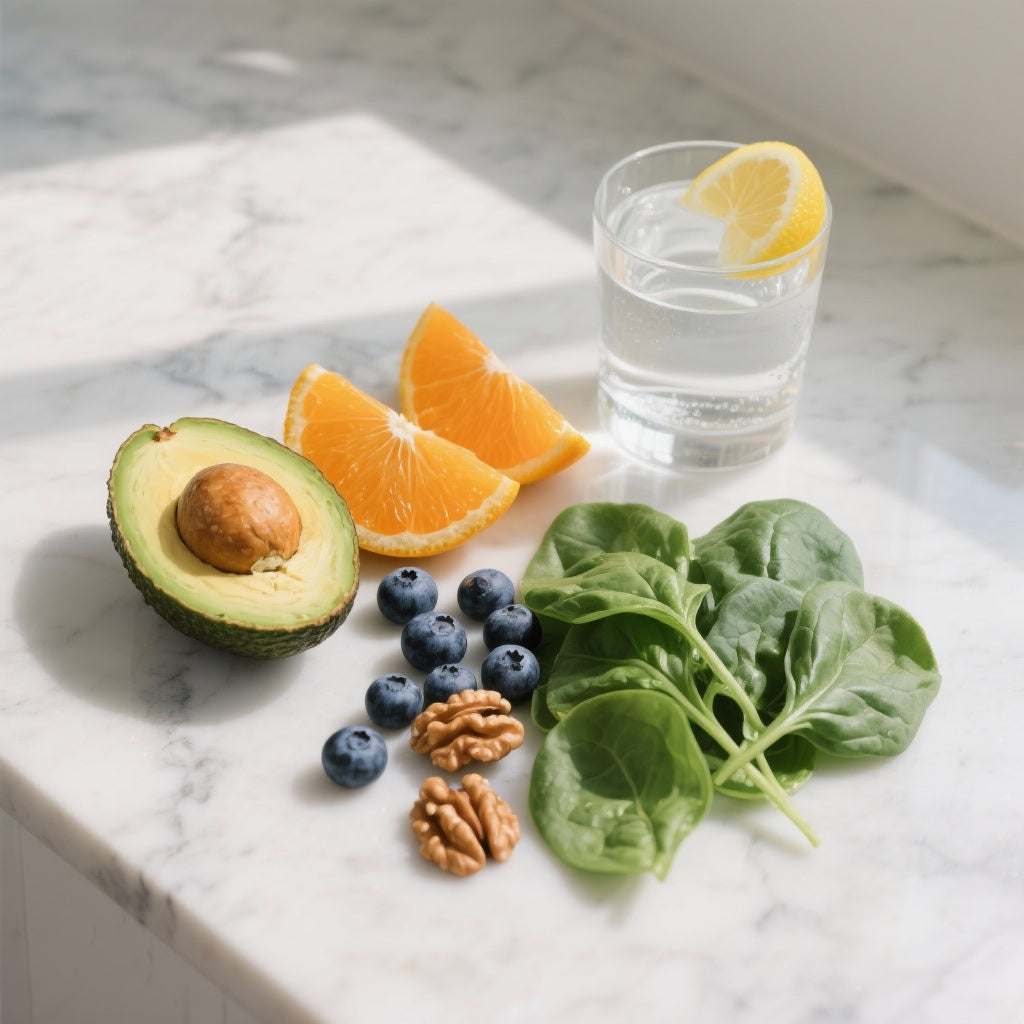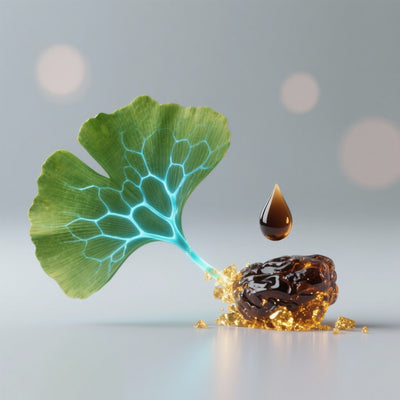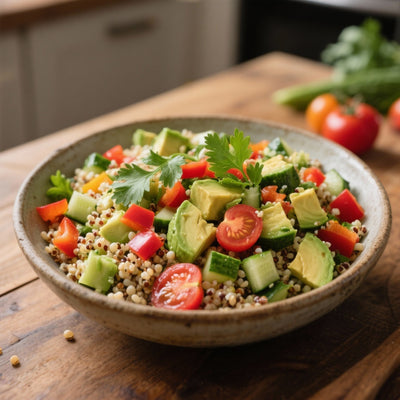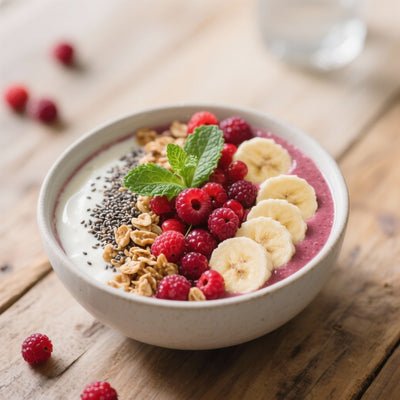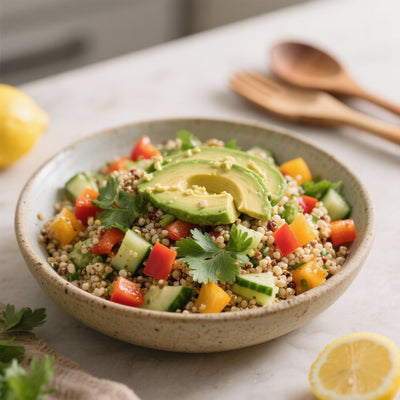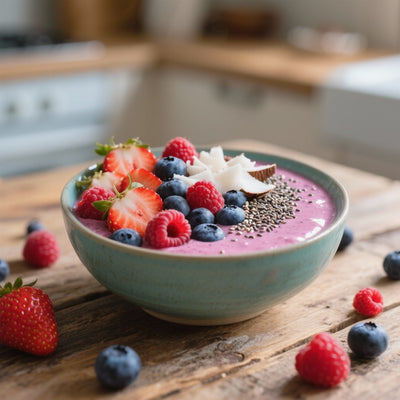Top 7 essential nutrients for radiant and healthy skin
Do you dream of visibly healthy, radiant, and resilient skin? You've probably already invested in expensive creams, serums, and masks. Yet, the most powerful secret to a radiant complexion isn't found in a jar, but rather on your plate. The adage "we are what we eat" has never been truer than when it comes to the health of our skin.
An unbalanced diet, stress, and environmental aggressors can quickly dull our complexion. The solution? Nourish your skin from within by providing the nutrients it desperately needs to regenerate, protect itself, and glow. In this comprehensive guide, we'll explore the 7 key nutrients for skin beauty, those that work together to build strong, supple, and healthy-looking skin. Get ready to transform your skincare routine, starting with your diet.
1. Vitamin C: The Architect of Radiance
Often associated with immunity, vitamin C is actually a superstar for the skin. It's a powerful antioxidant that plays a fundamental role in the production of collagen, the protein that ensures the firmness and elasticity of the skin.
Why is it crucial for the skin?
- Stimulates collagen: It is essential for collagen synthesis, thus helping to reduce the appearance of wrinkles and fine lines.
- Protects against free radicals: As an antioxidant, it neutralizes damage caused by the sun and pollution, preventing premature aging.
- Brightens the complexion: It helps inhibit melanin production, which can fade dark spots and even out skin tone.
"Without an adequate intake of vitamin C, the body simply cannot build and maintain a healthy collagen structure, which is the very foundation of youthful skin."
Where can you find it in your diet?
Think bright colors! Red peppers, broccoli, strawberries, citrus fruits (oranges, grapefruits), kiwi and leafy green vegetables like kale are excellent sources.
2. Vitamin E: The Protective Shield
Vitamin E is vitamin C's best ally. This fat-soluble antioxidant acts as a true shield, protecting cell membranes from oxidation. It is particularly effective at preserving skin hydration.
Why is it essential?
- Deep hydration: It strengthens the skin barrier, limiting water loss and maintaining soft and supple skin.
- Antioxidant synergy: It works hand in hand with vitamin C to offer enhanced protection against UV damage.
- Soothing action: Its anti-inflammatory properties help to calm irritations and redness.
Where can you find it in your diet?
The richest sources are vegetable oils (sunflower oil, wheat germ oil), nuts (almonds, hazelnuts), seeds (sunflower seeds) and avocados.
3. Vitamin A: The Cell Renovator
Vitamin A, and its derivatives like retinol, are famous for their dramatic anti-aging effects. They play a key role in the differentiation and growth of skin cells, promoting healthy cell renewal.
Why is she so powerful?
- Accelerates renewal: It stimulates the production of new cells, helping to smooth the skin's surface and unclog pores.
- Fights acne: By regulating sebum production and preventing follicle blockage, it is a powerful ally against imperfections.
- Reduces wrinkles: It promotes the production of collagen and elastin, improving skin texture and firmness.
Where can you find it in your diet?
It is found in two forms: retinol in animal products (liver, eggs, dairy products) and beta-carotene (which the body converts into vitamin A) in orange and yellow fruits and vegetables such as carrots, sweet potatoes, squash and apricots, as well as in spinach.
4. Zinc: The Guardian of Balance
Zinc is an often underestimated trace element, but it is vital for skin health, especially for problem skin. It acts as an exceptional regulator and repairer.
What is its role for the skin?
- Healing: It is essential to the tissue repair process and wound healing.
- Sebum regulation: It helps control the activity of the sebaceous glands, making it a key nutrient for oily and acne-prone skin.
- Anti-inflammatory: It soothes skin inflammation, thus reducing redness and swelling associated with acne or eczema.
Did you know? Zinc deficiency is often observed in people suffering from chronic acne. Supplementation can sometimes significantly improve the condition of the skin.
Where can you find it in your diet?
Oysters are the most concentrated source. It is also found in good quantities in red meat, poultry, pumpkin seeds, lentils and chickpeas.
5. Omega-3 Fatty Acids: The Masters of Hydration
Omega-3 fatty acids are essential "good fats" that make up a significant part of our skin cell membranes. They are crucial for a strong and well-hydrated skin barrier.
What are their benefits?
- They strengthen the lipid barrier: They help retain water in the epidermis, fighting against dryness and flaking.
- They calm inflammation: Their powerful anti-inflammatory properties are beneficial for conditions such as psoriasis, eczema, and rosacea.
- They protect from the sun: They can help reduce the skin's sensitivity to UV rays.
Where can you find them in your diet?
Oily fish such as salmon, mackerel, sardines, and herring are the best sources. For plant-based options, look to flax seeds, chia seeds, and walnuts.
6. Organic Silicon: The Pillar of Firmness
Less well-known than vitamins, silicon is nevertheless a fundamental trace element for the structure of connective tissues, including the skin. It is a direct precursor to the production of collagen and elastin.
Why is it indispensable?
- Improves elasticity: By participating in the synthesis of elastin, it helps the skin regain its suppleness.
- Structure of collagen: It plays a crucial role in the binding of collagen fibers, ensuring the cohesion and resistance of the skin.
- Promotes hydration: It helps the skin retain moisture, contributing to a plump and hydrated appearance.
Where can you find it in your diet?
It is found mainly in plants: field horsetail, nettle, bamboo, but also in whole grains such as oats, cucumber (with the skin), green beans and beer.
7. Polyphenols: The Antioxidant Warriors
Polyphenols are a large family of compounds found in plants, renowned for their incredible antioxidant properties. They protect the skin against a multitude of environmental aggressors.
What are their superpowers?
- Overall antioxidant defense: They fight free radicals very effectively, protecting cellular DNA.
- UV protection: Compounds such as resveratrol (grapes) or catechins (green tea) help to protect the skin from the harmful effects of the sun.
- Anti-inflammatories: They help reduce redness and soothe stressed skin.
Where can you find them in your diet?
The list is long! Think of green tea, dark chocolate (over 70% cocoa), berries (blueberries, raspberries), red grapes, extra virgin olive oil and spices like turmeric.
Frequently Asked Questions about Nutrition and Skin
Are dietary supplements necessary?
A varied and balanced diet should cover most of your needs. However, in some cases (restrictive diet, increased needs), a quality supplement can be an excellent support. Always speak to a healthcare professional before starting any course of treatment.
How long does it take to see results on the skin?
Patience is key. The skin's renewal cycle is approximately 28 days. Expect to see the first noticeable changes after 1 to 3 months of a rigorous and targeted diet.
What foods should you avoid for beautiful skin?
Limit refined sugars, excessive dairy products, and ultra-processed foods. These can promote inflammation, disrupt hormonal balance, and potentially worsen conditions like acne.
